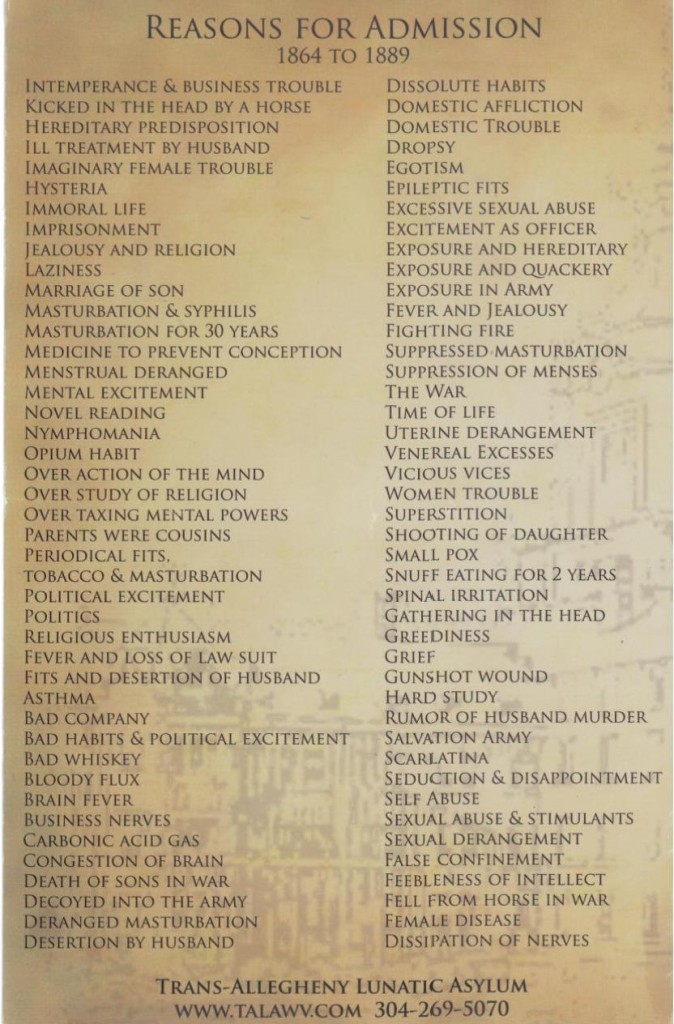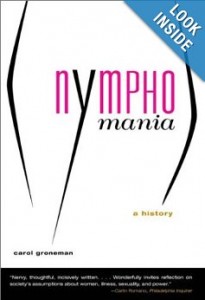“The solitude of writing is … quite frightening. It’s close sometimes to madness, one just disappears for a day and loses touch.” Nadine Gordimer
“It’s nervous work. The state you need to write in is the state that others are paying large sums to get rid of.” Shirley Hazzard
It’s often said that the writing of novels can be a symptom, maybe even a cause, of insanity.
Perhaps a person does have to be mad to write novels, to spend so much time alone spinning realities that no one shares till, God grant, readers enter the process. (Novelists who make enough money are of course exempt. In fact a lucky few, J.K. Rowling and Dan Brown among them, are considered very clearly sane indeed.)
Not so widely recognized is the danger reading novels was once thought to pose to one’s mental health.
Bangkok-based crime writer Christopher G. Moore has recently posted an interesting item regarding changing conceptions of madness over the years. His post included this 19th-century flyer.
“Novel reading” is listed among ways one could gain admittance to the Trans-Allegheny Lunatic Asylum. Directly beneath that appears “nymphomania.” That was probably only for reasons of alphabetical order, yet there is a more substantial connection between reading novels and nymphomania. Some nineteenth-century authorities believed that reading novels, in itself dangerous to your mental health, might also contribute to nymphomania. Here’s a poignant note from a case study reported in Nymphomania: A History, by Carol Groneman (reviewed in the New York Times):
‘Mrs. R., described as a short, stout, recently widowed twenty-year-old woman with a lively disposition, came to Dr. Bostwick out of desperation. She explained, “If I can’t be relieved of this agonizing condition, I am certain that the struggle between my moral sense and lascivious longings must soon send me to the grave.” She blamed reading novels and attending gay parties in her youth as the cause of “my imagination [being] wrought up to the highest point.”‘
Ms Groneman also reports a case where a woman so afflicted was advised by her doctor to give up writing novels.
As Chris Moore suggests, however, fashions in madness come and go. Given the number of people who appear to be at work or about to begin work on novels these days, those inclined to conformism might fear that not writing a book was a sign of serious abnormality. In an article entitled “Writers should take a year off, and give us all a break,” Colin Robinson says this:
‘According to Google, some 130m titles have been published since the first books took form on the desks of monks. This overwhelming catalogue is today being supplemented at a rate never before seen in the history of the book. Another industry statistician, Bowker, reports that nearly 1.8m new titles were published in 2012, an increase of half a million in just three years.’
Not so long ago, Julian Barnes could offer this advice: “It’s easy, after all, not to be a writer. Most people aren’t writers, and very little harm comes to them.”
No longer true, eh? It is no longer easy not to be a writer, and ever-larger portions of our populations must face concomitant threats to their well-being, large dollops of money rarely being one of these.
In conclusion, I’ll offer a contrarian perspective from Graham Greene:
“Writing is a form of therapy; sometimes I wonder how all those who do not write, compose or paint can manage to escape the madness, melancholia, the panic and fear which is inherent in a human situation.”



A few thoughts, if I may:
Saying that the flier reproduced above lists ways one could gain admission to an institution is kind of misleading. Since many of the entries are in the past tense (“Fell from horse”) we can assume these were copied from a line on a form in old medical records. In other words, they were written down to justify a decision that had already been made. There has never been more than one way somebody gets institutionalized: You annoy your neighbors and/or family. You can read a novel a day, get kicked in the head by a horse, and eat your own feces, but if you live quietly, go to work, pay your taxes, mow your lawn, and don’t leave your garbage cans on the curb all week, you will never be institutionalized.
I read a couple of articles that quote the Bowker statistic you mention, and nowhere did they say all these new titles were novels. It seems to me (and this is purely subjective and anecdotal evidence) that in the new wave of vanity press nonfiction titles outnumber fiction titles by a significant degree.
Who’s to say all those “new” writers aren’t seeking the therapeutic effect Green describes? “If I get famous, and have money, and sleep with author-boppers, maybe I won’t be depressed and angry all the time.” It’s expensive to self-publish, but it’s cheaper than most forms of psychotherapy. And it takes far less work to write a bad book than it does to succeed at therapy.
I meant to say exactly what I said. I like the idea, just for example, that you could gain admission to this loony bin, if you were so inclined, by hard dint of falling off your horse.
Of course you’re right that the list includes reasons that patients were admitted, though ‘novel reading’ would suggest that the resident doctors believed that this practice was deleterious to your mental health and, again to one so inclined, it presents one more way of winning a place inside.
I think you’re right, re. the proportion of self-published to mainstream offerings these days. I expect relatively few of the self-publlshed are writing for therapeutic reasons. But I love your observation that “… it takes far less work to write a bad book than it does to succeed at therapy.”